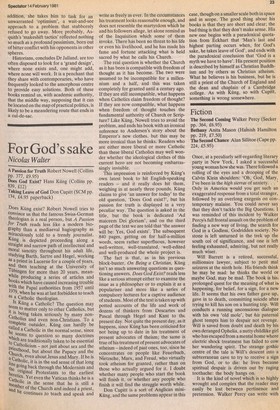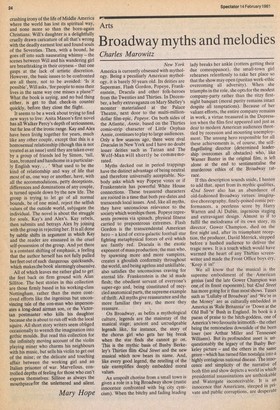Fiction
The Second Coming Walker Percy (Seeker pp. 364, £6.95) Bethany Anita Mason (Hainish Hamilton pp. 219, £7.50) The Second Chance Alan Sillitoe (Cape pp. 224, £5.95) Once, at a peculiarly self-regarding literary party in New York, I asked a successful young woman how she was. There followed a rolling of the eyes and a drooping of the Calvin Klein shoulders: `Oh, God, Mary, I've been in the high sierras of anxiety. Only in America would you get such an exaggerated response from a total stranger, followed by an overlong exegesis on contemporary malaise. You could never say that they don't tackle the Big Questions. I was reminded of this incident by Walker Percs full frontal assault on the problem of finding a new way of living, the search for God in a Godless, Godridden society. No stone is left unturned in the trek up the south col of significance, and one is left feeling exhausted, admiring, but not really much wiser, Will Barrett is a retired, successful, millionaire lawyer, subject to petit mal seizures at the ninth hole. His friends think he may be mad: he thinks the world or maybe Gad, may be mad. The book is his, prolonged quest for the meaning of what is happening, for belief, for a sign, for a new life. It seems that his own father gave up, gave in to death, committing suicide after trying to kill his son on a hunting trip. Will conducts a running unconscious dialogue with his own 'old mole', but his paternal ghost tempts him to despair not revenge. Will is saved from doubt and death by his own deranged Ophelia, a nutty childlike girl who has escaped from a mental home where electric shock treatment has failed to cow her wandering spirit. The strange gothic centre of the tale is' Will's descent into a subterranean cave to try to receive a sign from God, or to die: he lives because spiritual, despair is driven out by raging toothache: the body hangs on.
It is the kind of novel which is so highly wrought and complex that the reader may easily be lost between pertinence and pretension. Walker Percy can write with crushing irony of the life of Middle America where the world has lost its spiritual way, and none more so than the born-again Christians: Will's daughter is a delightfully cruelly drawn caricature of all that's wrong with the deadly earnest lost and found souls of the Seventies. Then, with a bound, he goes off into such nauseating whimsy — the scenes between Will and his wandering girl are breathtaking in their coyness — that one gasps at the lack of artistic discretion. However, the basic issues to be confronted are all there, not to be avoided: 'Is it possible', Will asks, `for people to miss their lives in the same way one misses a plane?' What the book is saying, and no bad thing either, is get to that check-in counter quickly, before they close the flight.
It seems to be a week about trying to find new ways to live: Anita Mason's first novel has all Walker Percy's depth of seriousness, but far less of the ironic range. Kay and Alex have been living together for years, much like any other couple, except that this is a homosexual relationship (though this is not treated as an issue) until they are taken over by a group of friends led by Simon, 'tall, lean, bronzed and handsome in a particularly English way. . . ' What used to be the kind of relationship and way of life that most of us, one way or another, have, with all the accommodations., petty deceptions, differences and dominations of any couple, is turned upside down by the new life. The group is trying to let go of all normal • bounds, be of one mind, reject the selfish values of the outside world, subjugate the individual. The novel is about the struggle for souls, Kay's and Alex's. Kay rebels, then submits and betrays Alex by joining with the group in rejecting her. It is all done by subtle shifts in argument in which Kay and the reader are ensnared in the cruel self-possession of the group. And yet there is a constant shifting of emphasis, a feeling that the author herself has not fully pulled her feet out of such 'dangerous quicksands, which makes the book alarmingly obsessive.
All of which leaves me rather glad to get the feet back on firm ground with Alan Sillitoe. The best stories in this collection are those firmly based in his working-class Nottingham, rather than the more contrived efforts like the ingenious but unconvincing tale of the con-man who impersonates a long-dead airman son, or the Victorian postmaster who kills his daughter because she is about to run off with the local squire. All short story writers seem obliged occasionally to wrench the imagination into gothic moulds. But read this collection for the infinitely moving account of the violin playing miner who charms his neighbours with his music, but sells his violin to get out of the mine; or the delicate and touching affair between the working girl and an Italian prisoner of war. Marvellous, controlled depths of feeling for those who can't express themselves: Sillitoe as always the mouthpiecefor the unlettered and silent.
Mary Hope







































 Previous page
Previous page